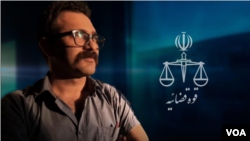An Iranian writer who produced a Farsi translation of a book praising Syrian Kurdish militias has been sentenced in Iran to an effective five-year prison term after a trial on security charges denounced as unjust by the man’s lawyer and by Iranian and American free speech advocates.
In a December 30 interview with VOA Persian from Tehran, lawyer Nasser Zarafshan said he received a notification that day of the sentencing of his client Arash Ganji by a Revolutionary Court in the Iranian capital. Two days earlier, the writer and translator had appeared in the courtroom for a trial on three charges of conspiring to harm Iran’s national security, being a member of an illegal group and spreading anti-government propaganda, the lawyer said.
Zarafshan said the charges related to Ganji’s work in producing a Farsi translation of a 2015 English-language book about U.S. and coalition-backed Syrian Kurdish militias who successfully defended the Syrian town of Kobani from an offensive launched by fighters of the Islamic State, also known as ISIS, the year before.
The book, titled A Small Key Can Open A Large Door: The Rojava Revolution, contains accounts of the Battle of Kobani from scholars and Syrian Kurdish fighters and was produced by an anonymous group of editors. Rojava is the name given by Kurdish nationalists to the Kurdish-populated regions of northern Syria administered by Kurdish militias after the outbreak of the Syrian civil war in 2011.
Kurdish rebels also have fought a decades-long insurgency against Iran’s Islamist rulers, accused by many minority Iranian Kurds of neglecting and impoverishing the predominantly ethnic Kurdish northwestern regions of the country.
Zarafshan said Ganji received three prison sentences from Iranian judge Mohammad Reza Amouzad for translating the book about the Syrian Kurdish rebels: five years for conspiracy, five years for belonging to an illegal group and one year for propaganda.
Under Iranian law, Ganji would have to serve only the longest of the prison terms, five years, if they are upheld in the appeal stage of the judicial process. Zarafshan said he would move forward with an appeal against the prison sentences in the coming days.
Ganji has been free on bail at his home in Tehran as he awaits the final outcome of his trial. Authorities initially arrested him on December 22, 2019 and held him at Tehran’s Evin prison until releasing him on January 19, 2020 on a 450 million toman bail, equivalent to about $17,000 based on the unofficial exchange rate tracked by bonbast.com.
Ganji was detained again on June 14, 2020 as he attended his first court hearing under another judge Mohammad Moghisseh who ordered his bail increased to 3 billion tomans or around $116,000. The writer was held at Evin for another six days until he paid the increased amount.
Zarafshan told VOA the charges against Ganji have no relation to the writer’s work in translating the book.
"The charge of membership of an illegal opposition group cannot be attributed to mere sympathy with a movement,” Zarafshan said, in reference to perceptions that Ganji sympathizes with the Syrian Kurdish militias who successfully battled ISIS and were the focus of the book that he translated.
Zarafshan also said the charge of conspiring to harm national security has no basis because authorities have not filed the same charge against anyone else in Ganji’s case and any conspiracy charge must involve the actions of two or more people.
“No attention was given to these concerns during the trial,” Zarafshan said, adding: ”Logic does not prevail in Iranian courts.”
The lawyer also said Ganji’s effective five-year prison sentence had been predetermined and dictated to the court by the intelligence officers who had arrested the writer.
VOA cannot independently verify the circumstances of Ganji’s trial as it is barred from reporting inside Iran. Iranian state media have made no mention of the writer’s sentencing.
The Iranian Writers Association (IWA), an organization that has campaigned for freedom of expression and against censorship in Iran since its founding in 1968, denounced the sentencing of Ganji in a Monday statement posted on its Telegram channel and on Facebook.
Ganji serves as secretary of the Iranian writers’ union.
“We demand the unconditional cancelation of the case against Ganji and call on writers and defenders of free speech to protest this verdict in every possible way,” IWA said.
The U.S. branch of worldwide writers’ association PEN International also condemned Ganji’s sentencing by Iran.
In a Friday statement, PEN America representative Karin Deutsch Karlekar called it an “absurd and an unquestionable violation of the fundamental human right to free expression.”
PEN America said Iran jailed at least four additional IWA members last year, including Baktash Abtin, Keyvan Bajan and Reza Khandan-Mahabadi, who were convicted of spreading anti-government propaganda and of conspiring against national security in 2019 and began serving their sentences in September 2020. It said the fourth member, poet Amin Moradi, was arrested on November 28 and detained at Evin prison on unspecified charges.
“We call for an immediate end to this pattern of abuse and disregard for the rule of law, and for unjustly incarcerated prisoners … to be freed immediately and unconditionally,” Karlekar said.
This story originated in VOA’s Persian Service. Click here for the original Persian version of the story.




